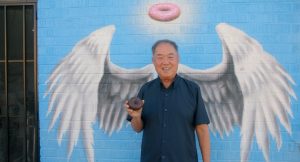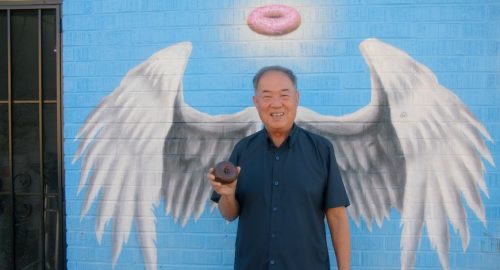By Chris Byrd | Catholic News Service
NEW YORK (CNS) — Despite obvious defects, the biographical documentary “The Donut King” provides fascinating insights into both the bright and dark sides of the American dream.
Presented as part of PBS’ “Independent Lens” series, the film premieres Monday, May 24, 10-11:30 p.m. EDT. Broadcast times may differ, though, so viewers should check their local listings.
Previously known as a cinematographer (“Take Every Wave: The Life of Laird Hamilton”), Alice Gu makes her directorial debut with “The Donut King,” which she also co-wrote with Carol Martori. Veteran director Ridley Scott served as one of the profile’s executive producers.
Given that the movie deals with war, the plight of refugees, gambling addiction, adultery and divorce, it’s obviously not suitable for children. Yet, a single crude expression notwithstanding, it is acceptable fare for mature teens as well as adults.

Viewers first encounter Ted Ngoy, from whose nickname the film takes its title, in 1975 when the then-33-year-old was working as a gas station attendant in the Orange County, California, city of Tustin. That’s where, he says, he “fell in love with doughnuts.”
Ngoy had arrived in the Golden State after fleeing the murderous Khmer Rouge regime in his native Cambodia, where his family, he recalls, “lived in hell.” In all, eight of his relatives, including his wife and their three children, were accepted into a refugee facility at San Diego County’s Marine Corps Base Camp Pendleton.
With financial backing from the Lutheran parish where he held a second job as a janitor, Ngoy purchased his first doughnut shop in 1976. Within three years, he owned 25 outlets and had dubbed his chain Christy’s after his spouse.
By 1985, according to food journalist Greg Nichols, Ngoy was worth $20 million. By his own estimation, he was making $100,000 a month leasing stores to fellow Cambodian Americans eager to follow the trail he had blazed. Known as Uncle Ted to his fellow countrymen and women, Ngoy sponsored over 100 of them as they resettled in the U.S.
By the time President George H.W. Bush conferred an award on him, Ngoy appeared to embody the American ideal. Yet he was swiftly brought down by his own mistakes.
A frequent visitor to Las Vegas, Ngoy became hooked on the excitement of gambling and greedy to profit from it. His focus on wagering, moreover, made him not only moody but violent as well. Although Christy stuck by him as he was going broke, Ngoy subsequently had an affair that led to the breakup of their marriage.
Abrupt transitions in Gu’s narrative of Ngoy’s rise and fall will likely confuse viewers, especially toward the end of “The Donut King” when the filmmaker seems to lose track of her subject. Nonetheless, there’s much to admire about the production.
There’s a charming scene of reunion, for instance, between Ngoy and 91-year-old Mel Allison, the former chief baker at the branch of Winchell’s Donuts where Ngoy trained and where Allison served as his mentor. And Gu strikes the right balance in presenting both the positive and negative aspects of Ngoy’s complex personality.
Ultimately, “The Donut King” also presents its audience with a valuable takeaway. Summing up what his wildly varied experiences have taught him, Ngoy observes that, in the end, it’s best “to live humble, simple.”
Byrd is a guest reviewer for Catholic News Service.






















